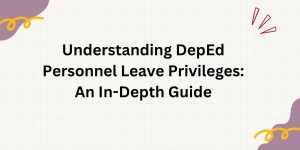Understanding DepEd Personnel Leave Privileges: An In-Depth Guide
I. Introduction

At the heart of the Philippines’ education system is the Department of Education (DepEd), a key player in sculpting the nation’s future through the provision of high-quality education. Integral to its operations is the well-being of its employees. Thus, DepEd has established an extensive range of leave privileges, as outlined in the Omnibus Rules on Leave. These DepEd Personnel Leave Privileges are designed to help employees balance their professional duties with personal needs, solidifying DepEd’s position as a desirable employer that values its staff’s work-life balance.
II. Exploring the Types of DepEd Personnel Leave Privileges
A. Regular Leaves
- Vacation Leave: As part of the DepEd Personnel Leave Privileges, all employees can enjoy 15 days of vacation leave annually. This leave can be taken in full or half-day increments, offering flexibility to staff members.
- Sick Leave: Mirroring the vacation leave, DepEd personnel also have access to 15 days of sick leave each year, which can be availed in full or half-day increments.
B. Parental Leaves
- Maternity Leave: Female DepEd personnel are entitled to 60 days of fully paid maternity leave for the first four deliveries. For subsequent deliveries, the leave period remains the same, but with half pay.
- Paternity Leave: Male DepEd personnel can avail of 7 days of fully paid paternity leave.
C. Special Leave Privileges
The DepEd Personnel Leave Privileges extend beyond regular and parental leaves, including special leave privileges for various situations:
- Filial Obligation Leave: This leave is intended for DepEd personnel who need to attend to urgent needs of immediate family members, such as a parent, spouse, or child.
- Domestic Emergency Leave: This leave is granted to DepEd personnel to deal with unexpected emergencies at home.
- Government Transaction Leave: This leave allows DepEd personnel to conduct necessary government business or transactions during working hours.
- Funeral/Mourning Leave: This leave is provided to DepEd personnel to attend the funeral or mourning rites of a close relative.
- Graduation Leave: This leave allows DepEd personnel to attend the graduation ceremonies of their children or siblings.
- Enrollment Leave: This leave is provided for DepEd personnel to accompany their children or siblings for school enrollment.
- Wedding/Anniversary Leave: This leave allows DepEd personnel to celebrate their wedding or anniversary.
- Birthday Leave: This leave is granted to DepEd personnel to commemorate their birthday.
- Hospitalization Leave: This leave is provided for DepEd personnel who are required to be hospitalized for health reasons. It is important to note that this leave is without pay and can be used for up to 60 days.
- Accident Leave: This leave is granted to DepEd personnel who have been involved in an accident and need time for recovery. Like hospitalization leave, it is also without pay and can be used for up to 60 days.
- Relocation Leave: This leave is provided for DepEd personnel who have been reassigned to a new location and need time to move and settle in. This leave is without pay and can be used for up to 30 days.
- Calamity Leave: This leave is granted to DepEd personnel who are directly affected by a calamity, such as a natural disaster. This leave is also without pay and can be used for up to 30 days.
Each of these special leave privileges caters to specific scenarios, providing support to DepEd personnel when they need it most.
III. The Procedure to Avail Leave Privileges
To access these DepEd Personnel Leave Privileges, employees must submit a written application to their immediate supervisor at least a week before the intended leave date. This application must be accompanied by relevant supporting documentation, such as a medical or death certificate.
IV. Conclusion
DepEd’s comprehensive approach to leave privileges underscores the organization’s commitment to employee welfare. These DepEd Personnel Leave Privileges play a pivotal role in maintaining a healthy work-life balance for employees, helping the Department attract and retain professionals dedicated to furthering quality education in the Philippines. This commitment to its personnel ultimately contributes to the strengthening of the nation’s educational infrastructure, paving the way for a brighter future for the country.
Read: Rehabilitation Leave Privilege: Understanding Our Rights






